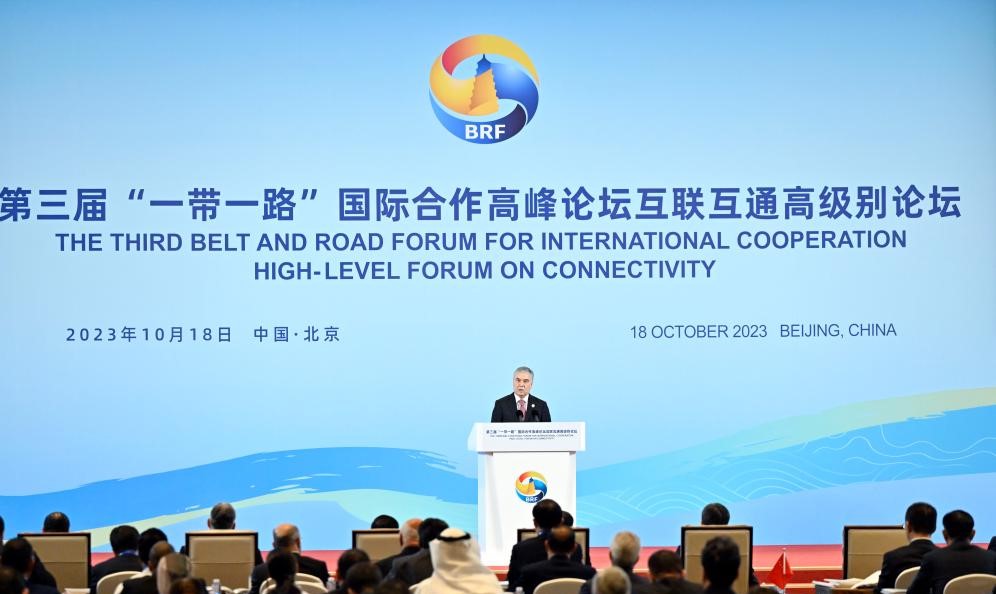Turkmenistan’s national leader and the speaker of the upper house of the Turkmen parliament, Gurbanguly Berdimuhamedow, outlined his country’s energy policy during a conference held on the sidelines of the third Belt and Road Forum for International Cooperation.
“We are working to expand the geographical reach and increase the volume of international supplies of Turkmen natural gas and electricity,” he stated, according to the state-run news agency Turkmenistan Today.
He further mentioned that “electricity transmission and fiber-optic communication lines have been established from Turkmenistan to Afghanistan and Pakistan, with several significant projects in these areas on the cooperation agenda.”
“The inauguration of the Turkmenistan-China gas pipeline in 2009 marked the inception of a new energy landscape on the continent and opened up opportunities for other nations to join the project on a mutually beneficial and equitable basis,” Berdimuhamedow emphasized.
He also highlighted the rationale behind another significant international project, the Turkmenistan-Afghanistan-Pakistan-India gas pipeline.
Regarding Turkmenistan’s transit potential, Berdimuhamedow explained that “Turkmenistan, in collaboration with its partners, is in the process of establishing an extensive network of transport and logistics infrastructure, connecting the East-West and North-South routes.” He stated that the international transport corridor would commence in China, traverse Central Asia, reach the Caspian Sea through Turkmen ports, and eventually link the Caspian, Black, and Baltic Sea regions. According to him, “this corridor can also be used in the opposite direction, towards the Asia-Pacific region and South Asian countries.”
“Our efforts are directed towards unlocking the full potential of transcontinental transportation through various modes, including railways, roads, air services, and the establishment of logistics terminals at hubs, with one of them potentially being the Turkmenbashi International Sea Port. We are prepared to make its facilities accessible for the benefit of our partners,” Berdimuhamedow noted.
The national leader of Turkmenistan also stressed the importance of “political logistics” in fostering international cooperation, asserting that “today, in our view, the concept of political logistics is highly relevant. I view it as a multi-tiered system of collaboration between countries sharing ideas and prospects for economic development, free from politicization and ideological clichés, based on equality, mutual respect, and the consideration of each other's interests.”
“Crucial components of the Turkmen approach include depoliticizing cooperation, moving away from the one-sidedness of energy and transport flows in favor of diversification and accessibility for broad international participation,” he added.
Berdimuhamedow also highlighted how friendship, good neighborly relations, and mutual interests have enabled Turkmenistan and China to successfully develop a partnership aimed at stimulating economic development in Eurasia, uniting regions from the Pacific to the Atlantic oceans based on modern criteria, forming interconnected production and technological cycles, and industrial belts.
In 2022, China’s annual trade turnover with Belt and Road Initiative (BRI) participating countries reached nearly $2.9 trillion, constituting 45.4 percent of China’s total foreign trade during that period. However, Central Asian states accounted for just over 3 percent of that total, approximately $70 billion.
Recently, Western countries criticized China’s BRI project for allegedly ensnaring economically vulnerable countries in unsustainable debt through large-scale infrastructure investments. An investigative report by The New York Times suggested that some BRI projects were imposed on states under favorable terms benefiting Chinese lenders and builders. In response, Chinese leaders vehemently denied the characterization of BRI as a “debt trap.”
A commentary published by the Chinese state news agency Xinhua argued that the “so-called debt trap” was often cited to support claims of “Chinese neocolonialism.” The commentary added, “This argument lacks fundamental logic and primarily serves as a political tactic of certain countries to tarnish China's reputation and create divisions between China and its Belt and Road partners.”







 President Ilham Aliyev shed light on the evolving contours of the peace process with Armenia during an international conference in Baku this week. ...
President Ilham Aliyev shed light on the evolving contours of the peace process with Armenia during an international conference in Baku this week. ...
 Azerbaijan and Armenia started the process of demarcation of their border on Tuesday, with the installation of the first border markers based on ge...
Azerbaijan and Armenia started the process of demarcation of their border on Tuesday, with the installation of the first border markers based on ge...
 Iran and Pakistan have signed eight cooperation documents in various fields, and agreed to strengthen ties to fight terrorism in the region.
Iran and Pakistan have signed eight cooperation documents in various fields, and agreed to strengthen ties to fight terrorism in the region.
 Iranian President Ebrahim Raisi expressed Tehran’s readiness to participate in significant development projects in Sri Lanka during the inauguratio...
Iranian President Ebrahim Raisi expressed Tehran’s readiness to participate in significant development projects in Sri Lanka during the inauguratio...
 As the conflict between Ukraine and Russia escalates, the strategic importance of Kharkiv, Ukraine's second-largest city, has come sharply into focus.
As the conflict between Ukraine and Russia escalates, the strategic importance of Kharkiv, Ukraine's second-largest city, has come sharply into focus.



